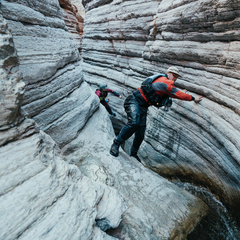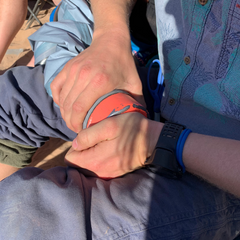9 Items You Need for Your Dry Suit Repair Kit
Whitewater dry wear is the largest apparel investment any boater can make. For those who want to extend the life and use of their dry suit (or dry top), it’s best to keep a dry suit repair kit on hand.
Our paddling experts at CKS Online have written a simple and inexpensive list of 9 items needed to build a dry suit repair kit.
1. Gasket Replacement
We recommend building your repair kit with a minimum of two wrist gasket replacements and two neck gasket replacements.
Doubling up on gaskets allows for two things:
The opportunity to try again if you mess up your first replacement attempt.
Gaskets can blow quicker than you think. Be safe & have extras on hand.
Gaskets are typically sized small and large:
Dry gear size small or smaller typically use small gaskets
Dry gear size medium and up typically use large gaskets
If you are unsure, your gaskets should have its size and manufactured date printed on the inside.
NRS and Kokatat each offer their own replacement gaskets, but you are able to mix brands if you’d like.
Remember! Replacement gaskets can become subject to dry rot.
2. Aquaseal
Aquaseal absolutely gets it done. This glue is a must-have in any boater’s dry bag and is a must-must have in any dry suit repair kit.
This stuff can repair the world… I am never on the water without it
–Bruce V., who bought Aquaseal
Remember! It’s best practice to store your Aquaseal in the freezer when not in use or with you on a river trip.
To thaw or for easier-flowing contents, soak tube in warm water for about 15 minutes.
3. Pair of Scissors
You can’t attach a new gasket if you don’t remove the old gasket! Using a pair of sharp scissors is best and safest for easy removal.
Other alternatives include:
Box cutter
X-Acto knife
Razor blade
5. Shape Retainers
Because latex is formless, you will need a solid object to form and fill the gasket you are replacing.
We’ve found that 32 oz. standard Nalgenes or similar water bottles work best for wrist gasket replacements.
Unfortunately, finding a good neck gasket mold is not as simple. We recommend adding the Kokatat Neck Gasket Tool Kit to your larger dry suit repair kit.
Neck Gasket Tool Kit Features:
(1) Melamine coated round repair board
(2) 1/2 circle clamp rings
(6) Spring Clamps
(1) Roll two-sided tape
(1) Neck gasket shape retainer form
(1) Instruction Sheet
4. Sandpaper
130 or 180 grit sandpaper is best for buffing your latex gasket replacement before using glue.
Often forgotten, this important item can make the difference between a replacement that lasts numerous river trips and a replacement that can barely last a week.
5. Rubber Bands
Rubber bands need to be added to your repair kit. These will help keep the newly glued gasket tight as it all cures together.
A great alternative to rubber bands are 1′ or 2′ NRS Cam Strap.
6. Pair of Disposable, Latex Gloves
Protect yourself from the tacky and stickiness of this entire process. Trust us – use gloves.
7. Small Square of Cardboard or Tarp
If you’re on the river, you’ll need to rest your gasket replacement on a solid sand-free surface to cure for 24 hours.
If you are on a trip with a group of drinkers, a spare empty beer box may work, but having extra dry cardboard or a tarp on hand can add another layer of protection from wind and elements while your glue cures.
8. Tear-Aid
While gaskets tend to be the primary focus of dry suit repair, sometimes the suit’s face fabric can be damaged, or the suit itself can be ripped or torn all the way through.
Tear-Aid flexes with the fabric really well. It’s super quick and effective to fix a dry suit. Plus Tear-Aid can still be removed when you’re ready and want to do a more permanent repair.
At CKS we prefer to use Tear-Aid instead of Aquaseal for field repairs.
Remember! Only Tear Aid Type A is appropriate for dry suit repair.
Do not use Tear Aid Type B for dry suit repair.
9. 303 Aerospace Protectant
Apply 303 Aerospace Protectant frequently to ensure the longevity of your gaskets. 303 contains UV protecting compounds that will extend the life of any gasket you apply it to. For these reasons, it definitely needs to be added to your drysuit repair kit.
Remember! 303 is also safe for use on Watershed dry bags.
We’ve noticed applying 303 routinely will retain Watershed’s unique and bright dry bag colors.
What about a cure accelerator?
Using a cure accelerator? Rad! You’ve cut your cure time down significantly.
If you’re able to carry this in your kit (note: some Aquaseal products do come with cure accelerators), make sure to pack a small disposable cup and a popsicle stick for mixing the cure accelerator with Aquaseal.
How to Bring Your Repair Kit on the River
If you’re planning your next cold-water or multi-day river trip and bringing your dry gear, like a dry suit or dry top, you should also plan to bring a dry suit repair kit.
All items listed above can fit into an ammo can or small dry bag for easy access.
When you return from the river, remember to place your Aquaseal back into the freezer and to re-store your latex replacement gaskets in an area where they are less likely to dry out (i.e. away from stoves, heaters and sunlight).
Don’t want to build your own kit?
Both NRS and Kokatat make their own separate wrist and neck gasket repair kits. Each comes with the gasket replacement, Aquaseal, and sandpaper. There are two distinct differences between the brands:
Kokatat comes with 303, NRS does not
NRS comes with cure accelerator and an applicator tool, Kokatat does not
The Field Repair Kit from Kokatat is a basic whitewater dry suit fabric repair kit.
The Kokatat Field Repair kit includes:
Instructions
2 alcohol wipes
Aquaseal adhesive
Zipper wax
4 assorted size fabric patches
2 Tear-Aid patches


